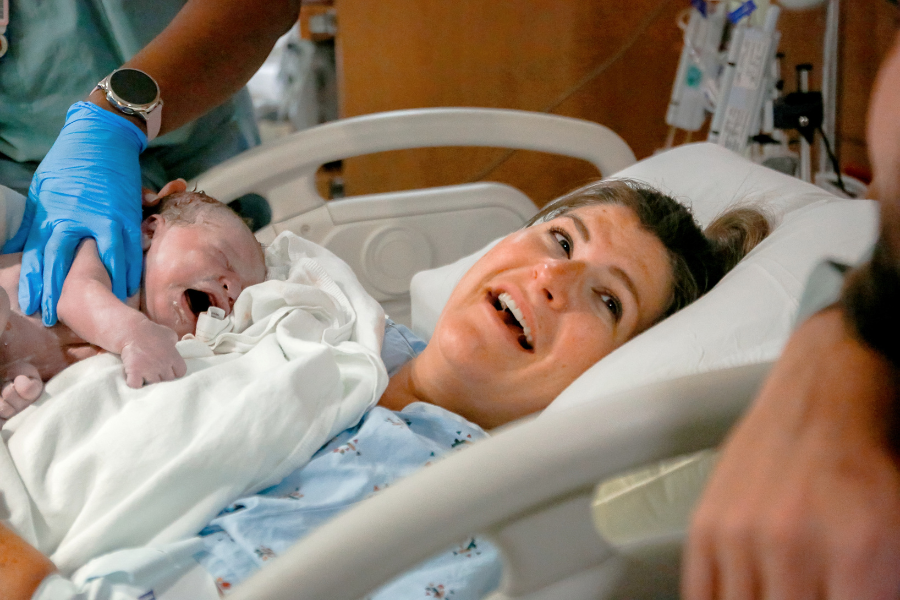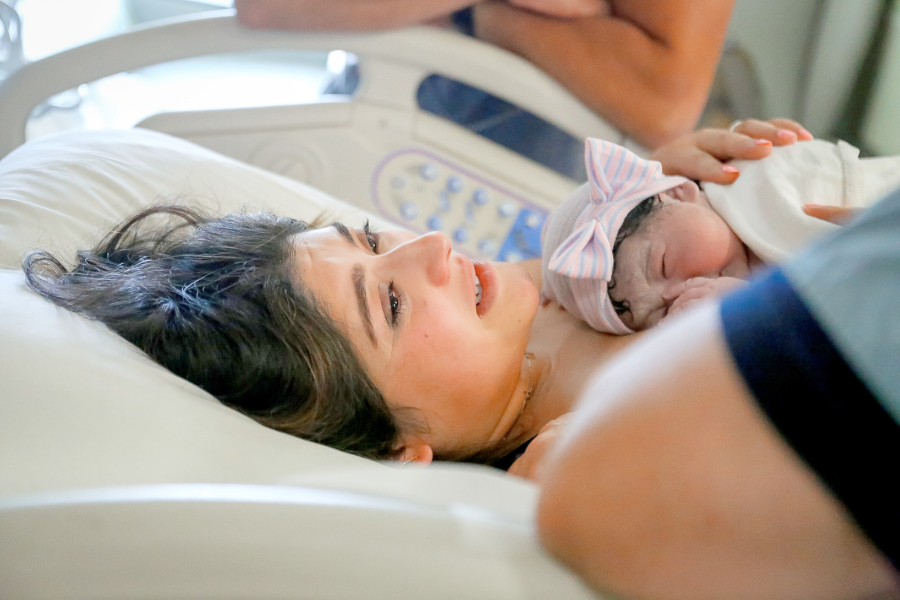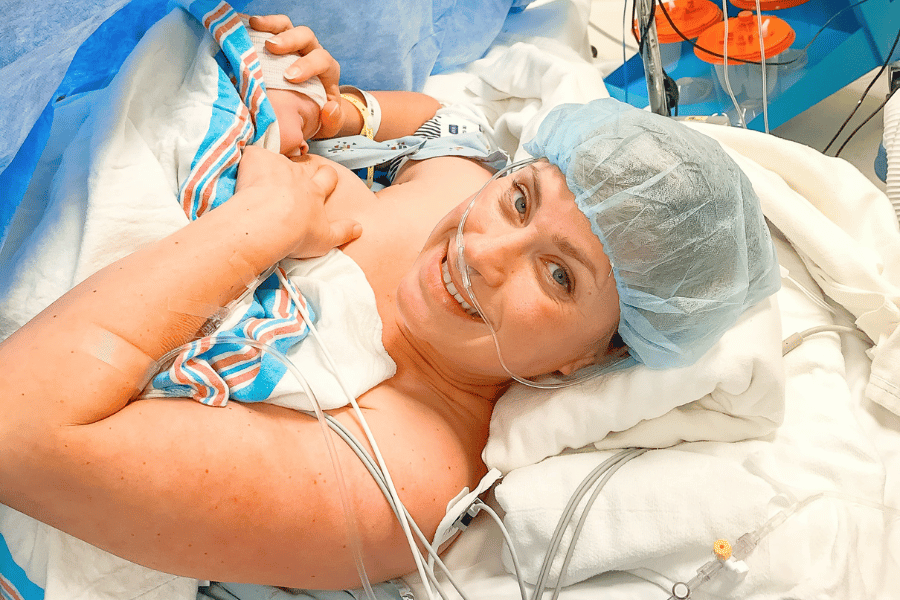What do Braxton Hicks contractions feel like? If this is your first pregnancy, you may be wondering what are those Braxton Hicks contractions everyone keeps talking about?
In short, Braxton Hicks can actually feel different for different women! But most often they feel like mild period cramps, or a sort of tightening across your baby bump. You can tell they’re NOT the real deal because they usually go away when you drink a big glass of water and lie down.
But that really only begins to scratch the surface of things. In this article, we’re going to talk more about what Braxton Hicks contractions feel like, why they happen, and WHEN they happen.
Follow @mommy.labornurse on Instagram to join our community of over 650k for education, tips, and solidarity on all things pregnancy, birth, and postpartum!
What are Braxton Hicks?
Let’s start off with an overview of what Braxton Hicks even are! This is a very common phenomenon that happens during pregnancy. In fact, experts agree that they happen in ALL pregnancies, but not every pregnant woman will be aware of them. However, most mamas will notice them in their third trimester, and especially as their due date draws closer (source).
When you have a Braxton Hicks contraction, your uterus will gently tighten for 30-60 seconds (but sometimes as long as 2 minutes). For mama, this can feel like a period cramp or a tightening across the stomach.
What’s different about Braxton Hicks contractions from labor contractions, is that they are typically infrequent, unpredictable, and irregular. This means you may have a few back-to-back for a few minutes, but then not have one for a few hours or days.
What do Braxton Hicks contractions feel like?
To understand what Braxton Hicks contractions feel like, especially in comparison to true contractions it’s most helpful to know that they are described more as uncomfortable, not painful.
They can feel like period cramps, but many moms describe them as a kind of hardening or tightening of the stomach. Lots of moms specifically say their belly hardens up like a basketball! This can happen from the top down, or kind of in a band across your stomach.
I always tell mamas that if you happen to notice your belly is getting hard intermittently every once in a while, but it’s not really bothering you too much, you are probably having Braxton Hicks contractions!
Other characteristics of Braxton Hicks
In addition to Braxton Hicks being more annoying and uncomfortable than painful, there are some other characteristics that are unique to Braxton Hicks compared to labor contractions:
- They’re usually irregular. This means they don’t follow any kind of pattern of coming at regular intervals or lasting for similar amounts of time
- They’re intermittent. By this, I mean that you might have one, or maybe a few together, and then they totally stop for awhile
- They don’t increase in intensity. With labor contractions, they will be painful, and they will get more rhythmic and more intense as time passes
- They stop with relief efforts. These are things like changing what you’re doing, drinking water, or resting (more on this below!)
Am I having Braxton Hicks contractions?
First-time mamas especially have a hard time differentiating between these and real contractions, which is totally understandable! You’ve never experienced a real contraction to know what painful really means.
And mama, I’m not saying that to poke fun, but to empathize with why it can throw your mind for a loop!
If you are unsure about what you are feeling, it never hurts to make a call! The last thing I want is for you to be experiencing preterm labor that requires medical attention and write it off as Braxton Hicks!
Also, check out these warning signs to watch out for during your pregnancy.
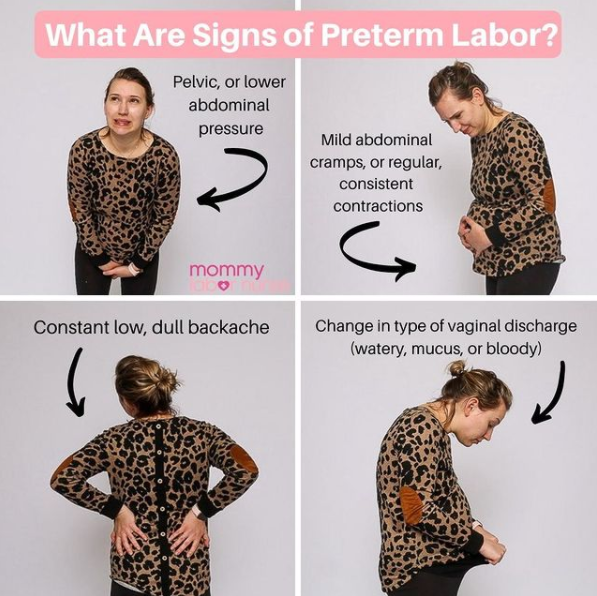
When do Braxton Hicks happen?
Most women report the majority of their Braxton Hicks contractions occurring in the third trimester. However, they can appear as early as the second trimester.
I was 20 weeks pregnant when I felt my first Braxton Hicks contraction. And, I had them almost every day up until delivery.
Every pregnancy varies. Some women have irritable uteruses, and they tend to have more than the average person.
Some scenarios that can cause or make you more prone to Braxton Hicks are:
- Increased activity: A lot of mamas will start to experience them if they are on their feet all day, do a lot more walking or hiking than usual, or right after exercising
- Sexual intercourse: Sex during pregnancy is considered totally safe for MOST pregnant women, but be aware that it may stimulate some Braxton Hicks contractions immediately after
- A full bladder: This is because a full bladder can put pressure on the uterus, which can lead to some cramping/contracting
- Dehydration: This is a super common reason mamas experience Braxton Hicks! Staying hydrated during pregnancy is important for so many reasons, but this is an extra motivator
Related Reading: Sex During Pregnancy: All Your Questions Answered
Why do Braxton Hicks contractions happen?
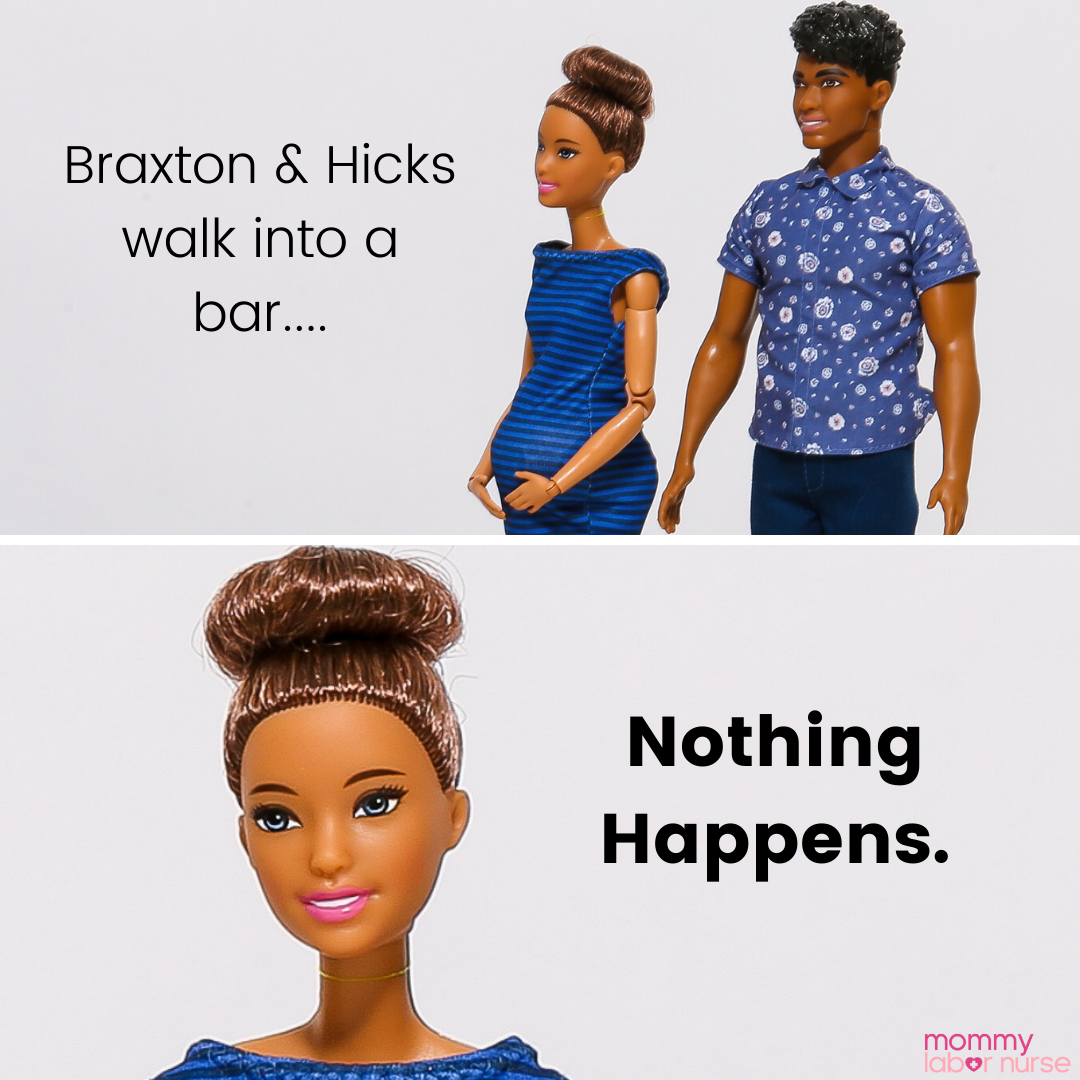
Okay, so that joke is true to an extent, hah! It’s true that Braxton Hick do not cause your cervix to dilate, and do not end with birth. But, researchers have figured out that they are probably doing SOMETHING to help kind of prep your body for labor.
You see, your uterus, pelvic floor, and abdomen are all made up of muscles. When you are in labor, the muscles of your uterus contract in order to dilate (open) your cervix, which slowly moves and pushes baby down through your pelvis.
Once you are fully dilated and baby is low enough in your pelvis, baby crowns, and you push them out. This process of contracting baby far enough down into your pelvis until you are 10 centimeters dilated is called the first stage of labor (there are actually four stages!).
What does this have to do with Braxton Hicks? Well it’s widely accepted that Braxton Hicks is your body’s way of helping your uterus practice being in labor, before actually being in labor.
Related Reading: How to Push During Birth
Can I do anything to alleviate Braxton Hicks?
Actually yes! And this is one of the big things that sets Braxton Hicks apart from real contractions. A hallmark of Braxton Hicks contractions is that they go away completely when you practice some relief efforts.
Here are are a few things that you can do to calm them down:
1. Drink water
Your uterus contracts much more when you are dehydrated. In fact, if you are dehydrated, those Braxton Hicks contractions might actually HURT! This is the #1 way to slow down Braxton Hicks, so always keep a huge water bottle near you.
2. Empty your bladder
I know, you probably already pee 20 times a day. Well the truth is, if your bladder is full, it can definitely cause your uterus to contract more, so go pee!
3. Change positions
An increase in activity can cause your uterus to contract more. Sometimes simply lying down and resting can help to calm things down.
4. A hot bath or warm compress
Just how a warm heating pad helps menstrual cramps or a backache, heat will help relax those muscles, and alleviate discomfort.
Braxton Hicks can be annoying, but they’re harmless
Well mama, there you have it. Everything you need to know about Braxton Hicks contractions all laid out for you. I know they are annoying, but they do sort of come with the territory and are luckily nothing to worry about!



